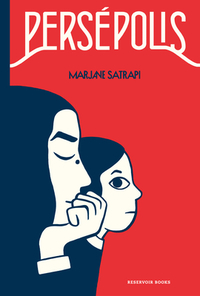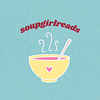Take a photo of a barcode or cover
Second time reading this one (but first attempt in doing so in French, jiji).
I first read it when I was in high school. Six years later (and after living alone in Mexico and Europe) this book hit me completely different and made me relate to 14-18 year old Marjane in a new way.
Besides being an autobiography that also shows the complex Iranian socio-cultural context, it is a portrait of rebellion, integrity, and self expression.
Thank you, Marjane Satrapi for being brave and staying authentic ✨
I first read it when I was in high school. Six years later (and after living alone in Mexico and Europe) this book hit me completely different and made me relate to 14-18 year old Marjane in a new way.
Besides being an autobiography that also shows the complex Iranian socio-cultural context, it is a portrait of rebellion, integrity, and self expression.
Thank you, Marjane Satrapi for being brave and staying authentic ✨
dark
inspiring
reflective
medium-paced
Could not be better.
This book was a quick read, and it was also fascinating. The graphic novel form was such a unique and refreshing way for Satrapi to tell her story. It was also not difficult to follow, even for someone like me who has a very poor grasp of Iranian history.
an inside look into the Iranian people and life in Iran.
An inside view of what it means to live in Iran. The restrictions and the small rebellions that citizens perform everyday. Eye opening.
The more time passed, the more I became conscious of the contrast between the official representation of my country and the real life of the people, the one that went on behind the walls. (p. 304)
Autografia en cómic, montones de humor negro, reírse de sí misma sin darse con el látigo y reírse también de las situaciones más extremas... hasta que deja de reírse y se te encoge el corazón. No sabía nada de la Historia reciente de Irán, es interesante conocer algo. Religiosidad, revolución, fanatismo, dar tumbos hasta centrarse, vivir una doble vida, todos podemos sentirnos reflejados, pero, a la vez, creo que ninguno acertamos a abarcar la magnitud de la crueldad y sinrazón del régimen islamista. Gracias a quien se lo dejó en el hotel, se viene a casa conmigo, por lo prestaré y lo releeré... si me lo devuelven
Overall, I think this is a very important and informative read about the history of Iranian politics, the Islamic Revolution, and what it is like to live under conflict and authoritarian religious rule. However, I give this three stars because there were some very clear blind spots by the author that appeared to show aspects of classism, negative judgement towards feminism and advocacy styles that did not align with her own, and a lack of introspection about her own personal relationships and how she treats the people around her.
First of all, I do want to say that definitely appreciated how the author included anecdotes which showed her flaws, mistakes, blind spots, and ignorance instead of just making herself out to be a perfect protagonist (which easily could have been done, since this is a memoir written about herself and her life). That being said, there were definitely some moments where the younger version of the author would do/say something seemingly quite problematic, and there would be no disclaimer from her adult version about how she now knows better.
The most prominent example is the disturbing anecdote about how she wrongfully accuses a "scruffy man on the street" of catcalling her in order to distract the police and evade arrest herself for wearing makeup. Although her grandmother severely calls her out on her bad behavior, this anecdote just ends with her grandmother eventually forgiving her without her "adult" self explicitly taking accountability for this serious false accusation. I also have to point out that the emphasis on the "scruffiness" of the man was just one example of the underlying classism that I felt from the author all throughout this novel.
I also felt that the author often blamed everyone else for her unhappiness instead of relying on introspection to see where she could have done better, especially with regards to personal relationships that have gone sour over the years. This was most prominently depicted in scenes involving her relationship with her ex-husband. I definitely acknowledge that there is a distinct power dynamic between husband and wife (especially in a couple living in Tehran at that time), but I often found myself wondering whether she could have reflected on what she herself could have done better in that marriage - and this never happened. The dissolution of their marriage was pretty much just chalked up to implications that her ex-husband was a bit of a misogynistic traditional man, while she was the carefree woman who tried her best to save the relationship, but needed independence.
On a similar note, the author appeared to judge harshly those who did not share her values about activism and feminism, often relying on the age-old, cheap trope of ugly, fat = bad, stupid = bad (e.g., calling her landlord a fat horse-face, calling her cousin an imbecile). While I deeply empathize with her experiences as an Iranian woman thrown into a predominantly white community at a very young age, as well as the struggles she faced reconciling her experiences abroad with her community in Iran, it really bothered me as a reader how she appeared to constantly distill her conflicts with her community either through name-calling or sheer disdain at their "ignorance." Especially for the latter, I think this is where I really saw the author's blind spot of not acknowledging her own privilege of coming from a upper middle class family who could fund her education abroad. It made me sad to think that the author believes that anyone who doesn't fit a certain mold of feminism is "inane" or an "imbecile."
Again, I appreciate that the author depicted herself as an imperfect individual who was just trying to survive a deeply difficult childhood and young adulthood full of war, oppression, racism, and conflict. I just think the author's growth and maturity, alongside the growth and maturity of 21st century feminism, could be depicted even better with more clear and explicit introspection and accountability on behalf of the adult version of the author.
First of all, I do want to say that definitely appreciated how the author included anecdotes which showed her flaws, mistakes, blind spots, and ignorance instead of just making herself out to be a perfect protagonist (which easily could have been done, since this is a memoir written about herself and her life). That being said, there were definitely some moments where the younger version of the author would do/say something seemingly quite problematic, and there would be no disclaimer from her adult version about how she now knows better.
The most prominent example is the disturbing anecdote about how she wrongfully accuses a "scruffy man on the street" of catcalling her in order to distract the police and evade arrest herself for wearing makeup. Although her grandmother severely calls her out on her bad behavior, this anecdote just ends with her grandmother eventually forgiving her without her "adult" self explicitly taking accountability for this serious false accusation. I also have to point out that the emphasis on the "scruffiness" of the man was just one example of the underlying classism that I felt from the author all throughout this novel.
I also felt that the author often blamed everyone else for her unhappiness instead of relying on introspection to see where she could have done better, especially with regards to personal relationships that have gone sour over the years. This was most prominently depicted in scenes involving her relationship with her ex-husband. I definitely acknowledge that there is a distinct power dynamic between husband and wife (especially in a couple living in Tehran at that time), but I often found myself wondering whether she could have reflected on what she herself could have done better in that marriage - and this never happened. The dissolution of their marriage was pretty much just chalked up to implications that her ex-husband was a bit of a misogynistic traditional man, while she was the carefree woman who tried her best to save the relationship, but needed independence.
On a similar note, the author appeared to judge harshly those who did not share her values about activism and feminism, often relying on the age-old, cheap trope of ugly, fat = bad, stupid = bad (e.g., calling her landlord a fat horse-face, calling her cousin an imbecile). While I deeply empathize with her experiences as an Iranian woman thrown into a predominantly white community at a very young age, as well as the struggles she faced reconciling her experiences abroad with her community in Iran, it really bothered me as a reader how she appeared to constantly distill her conflicts with her community either through name-calling or sheer disdain at their "ignorance." Especially for the latter, I think this is where I really saw the author's blind spot of not acknowledging her own privilege of coming from a upper middle class family who could fund her education abroad. It made me sad to think that the author believes that anyone who doesn't fit a certain mold of feminism is "inane" or an "imbecile."
Again, I appreciate that the author depicted herself as an imperfect individual who was just trying to survive a deeply difficult childhood and young adulthood full of war, oppression, racism, and conflict. I just think the author's growth and maturity, alongside the growth and maturity of 21st century feminism, could be depicted even better with more clear and explicit introspection and accountability on behalf of the adult version of the author.
(4.5)
Really enjoyed this. Was gripped pretty much straight away and couldn't put down. So many interesting topics and circumstances explored in this book. Thought Satrapi had a great way of weaving in humour, even at heartbreaking moments and it just worked! The writing was very inspirational.
Also gave me an insight into cultures I knew little about, as well as the challenges of being an immigrant. Very relevant to current climate in many ways too.
Highly recommend
Really enjoyed this. Was gripped pretty much straight away and couldn't put down. So many interesting topics and circumstances explored in this book. Thought Satrapi had a great way of weaving in humour, even at heartbreaking moments and it just worked! The writing was very inspirational.
Also gave me an insight into cultures I knew little about, as well as the challenges of being an immigrant. Very relevant to current climate in many ways too.
Highly recommend
dark
emotional
reflective
sad
tense
slow-paced
a very personal recounting of the author's life living in iran. if you're hoping for a recounting of the historical events, you'll be disappointed, but that allows it to speak to a broader truth about oppressive regimes, no matter where they rear their heads






